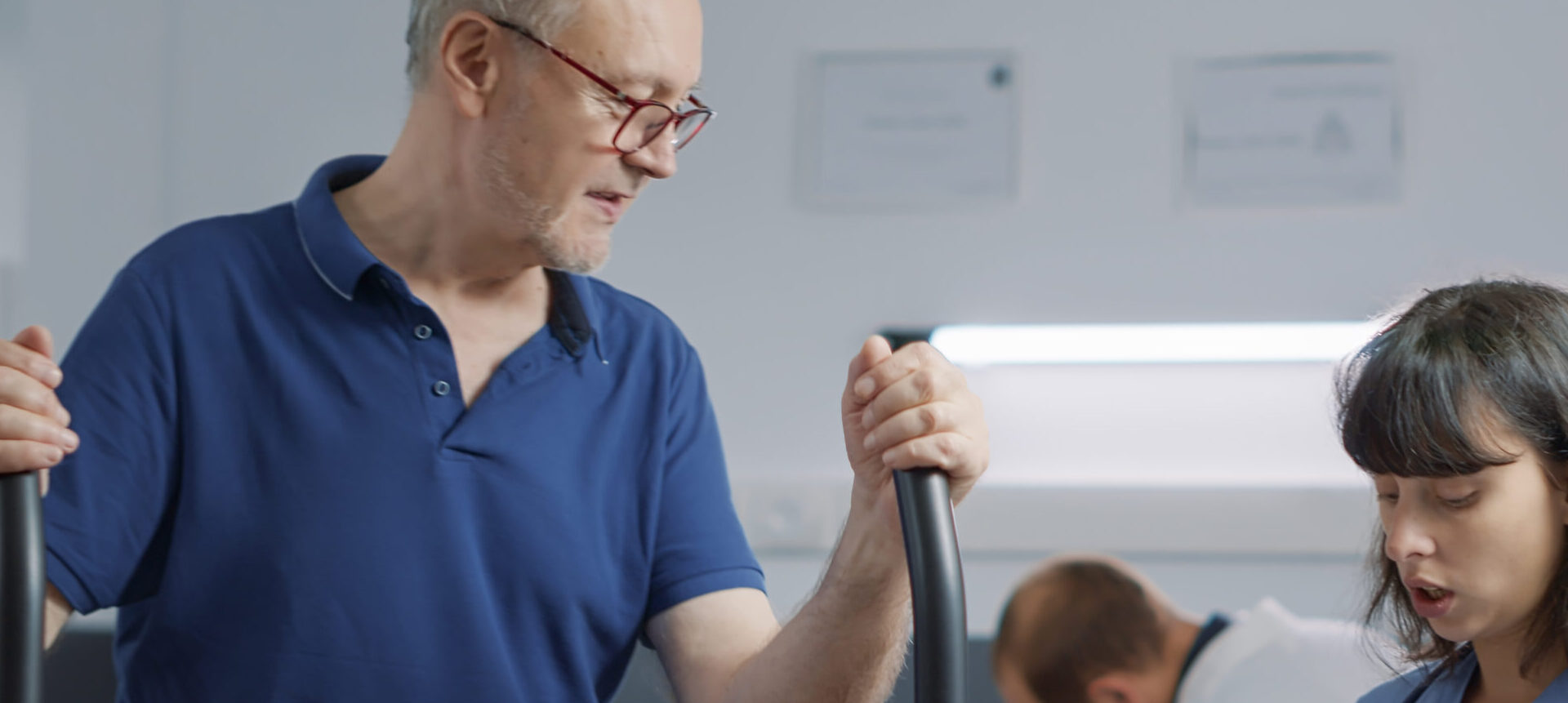Best Care for Parkinson's Patients
Improving strength, & cognitive function to slow down the disease progress
When Parkinson's Care was Needed?
A well-rounded Parkinson’s Care regimen focuses on enhancing a patient's physical strength, balance, flexibility, cognitive abilities, and emotional health, ensuring a holistic improvement in their quality of life. Research indicates that proactive engagement with a dedicated Parkinson’s Rehabilitation program can significantly decelerate the disease's progression, preserving the patient's functionality and independence.
1. Medical Therapy and Primary Specialist: Medications are pivotal in Parkinson's management. A specialist, well-versed in Parkinson's nuances, will curate a medication regimen tailored to both mitigate the disease's symptoms and slow its advancement.
2. Comprehensive Therapies: Employing a multifaceted approach that integrates various therapeutic modalities proves highly effective in addressing the diverse challenges posed by Parkinson’s disease.
3. Personalized Intervention: Every patient's journey with Parkinson's is unique. Specialists craft individualized strategies, focusing on minimizing disability and bolstering the patient's adaptive skills, ensuring interventions resonate with each patient's specific needs.
4. Evaluation fo Progress: Continuous monitoring by a dedicated team ensures that the impact of therapies is assessed in real-time. This dynamic evaluation allows for timely adjustments to the care plan, ensuring it remains aligned with the patient's evolving needs.
Key Components of Parkinson’s Care
Parkinson’s care involves several key components to manage the disease effectively. Medication management is crucial to control symptoms and improve quality of life. Regular exercise and physical therapy help maintain mobility and balance. Speech and occupational therapies address communication and daily living challenges. Nutritional support ensures a balanced diet to combat weight loss and constipation. Psychological support, including counseling and support groups, helps manage depression and anxiety. Caregiver education provides essential knowledge for effective care at home. Lastly, regular medical check-ups ensure timely adjustments to the treatment plan.

Gait, Balance, and Mobility Training

Psychology & Emotional Wellbeing

Respiratory Therapy

Cognitive Behavioral Therapy

Physiotherapy

Therapeutic Recreation

Visual and Speech Therapy

Occupational Therapy

Therapeutic Recreation
Key Components of Parkinson’s Care
Parkinson’s care involves several key components to manage the disease effectively. Medication management is crucial to control symptoms and improve quality of life. Regular exercise and physical therapy help maintain mobility and balance. Speech and occupational therapies address communication and daily living challenges. Nutritional support ensures a balanced diet to combat weight loss and constipation. Psychological support, including counseling and support groups, helps manage depression and anxiety. Caregiver education provides essential knowledge for effective care at home. Lastly, regular medical check-ups ensure timely adjustments to the treatment plan.

Cognitive Behavioral Therapy

Psychology & Emotional Wellbeing

Gait, Balance, and Mobility Training

Nurturing Confidence

Nutrition and Swallow Therapy

Promoting Functional Independence

Respiratory Therapy

Strength Training

Visual and Speech Therapy
3 steps for getting the best recovery plan
During the crucial initial 90-day "Golden Period" following a stroke, it is imperative to take primary steps towards rehabilitation care

BOOK APPOINTMENT

VISIT FACILITY

BEGIN RECOVERY



Essential Components of Parkinson’s Rehabilitation
Medications are pivotal in Parkinson's management. A specialist, well-versed in Parkinson's nuances, will curate a medication regimen tailored to both mitigate the disease's symptoms and slow its advancement.
Medications are pivotal in Parkinson's management. A specialist, well-versed in Parkinson's nuances, will curate a medication regimen tailored to both mitigate the disease's symptoms and slow its advancement.
Every patient's journey with Parkinson's is unique. Specialists craft individualized strategies, focusing on minimizing disability and bolstering the patient's adaptive skills, ensuring interventions resonate with each patient's specific needs.
Continuous monitoring by a dedicated team ensures that the impact of therapies is assessed in real-time. This dynamic evaluation allows for timely adjustments to the care plan, ensuring it remains aligned with the patient's evolving needs.



Essential Components of Parkinson’s Rehabilitation
Medications are pivotal in Parkinson's management. A specialist, well-versed in Parkinson's nuances, will curate a medication regimen tailored to both mitigate the disease's symptoms and slow its advancement.
Employing a multifaceted approach that integrates various therapeutic modalities proves highly effective in addressing the diverse challenges posed by Parkinson’s disease.
Every patient's journey with Parkinson's is unique. Specialists craft individualized strategies, focusing on minimizing disability and bolstering the patient's adaptive skills, ensuring interventions resonate with each patient's specific needs.
Continuous monitoring by a dedicated team ensures that the impact of therapies is assessed in real-time. This dynamic evaluation allows for timely adjustments to the care plan, ensuring it remains aligned with the patient's evolving needs.

Parkinson's care services in a rehabilitation center are designed to provide comprehensive support for individuals living with Parkinson's disease. These services typically include a multidisciplinary approach, involving neurologists, physical therapists, occupational therapists, and speech therapists who work together to address the diverse needs of patients. The goal is to enhance mobility, improve daily functioning, and manage symptoms through personalized therapy plans. Rehabilitation centers often offer specialized programs such as exercise routines to maintain motor skills, cognitive therapies to support mental health, and adaptive strategies to help patients maintain independence. Additionally, patient education and family support are integral parts of the service, ensuring that individuals and their caregivers have the tools and knowledge needed to navigate the challenges of Parkinson's disease effectively.
+ Contact UsTreated Patients Coming from Leading Hospitals





